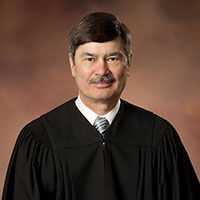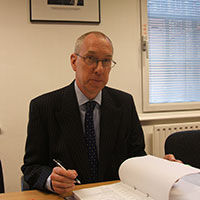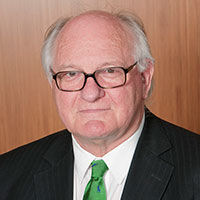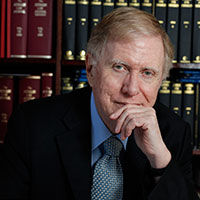Judicial Recusal: 21st-Century Challenges - Speaker profiles
Raymond J. McKoski
 Judge Raymond J. McKoski served as a state court trial judge in the United States for 25 years before retiring in 2010. Currently, he teaches courses in professional responsibility and the jury process at The John Marshall Law School in Chicago, Illinois. Judge McKoski also serves as the Vice-Chair of the Illinois Judicial Ethics Advisory Committee and as an editorial board member of the British Journal of American Legal Studies.
Judge Raymond J. McKoski served as a state court trial judge in the United States for 25 years before retiring in 2010. Currently, he teaches courses in professional responsibility and the jury process at The John Marshall Law School in Chicago, Illinois. Judge McKoski also serves as the Vice-Chair of the Illinois Judicial Ethics Advisory Committee and as an editorial board member of the British Journal of American Legal Studies.
As a faculty member of the Illinois Supreme Court Judicial Conference, Ray participates in the ethics education of all newly appointed judges in the state of Illinois and also presents seminars on ethics-related topics including judicial disqualification, ex parte communications, political and charitable activities of judges, and the “appearance of impropriety.” His most recent law review article is Disqualifying Judges When Their Impartiality Might Reasonably be Questioned: Moving Beyond a Failed Standard, 56 Arizona Law Review 411 (2014). Ray graduated summa cum laude from the DePaul University College of Law, Chicago, Illinois, in 1972.
Mark George QC
 Mark George QC is Head of Chambers at Garden Court North Chambers in Manchester. He has been a barrister for more than 35 years specialising in criminal defence work, prison law and inquests. He is currently instructed in the Hillsborough Inquests as part of a team representing 22 of the families who lost loved ones in the Hillsborough Stadium disaster in 1989.
Mark George QC is Head of Chambers at Garden Court North Chambers in Manchester. He has been a barrister for more than 35 years specialising in criminal defence work, prison law and inquests. He is currently instructed in the Hillsborough Inquests as part of a team representing 22 of the families who lost loved ones in the Hillsborough Stadium disaster in 1989.
Mark is a regular commentator on social media and an outspoken critic of government policy on legal aid and cuts in the probation service. He has written a number of articles for the JusticeGap website and is a prolific Tweeter on issues relating to the criminal justice system, human rights and recent development in criminal law.
Mark is also an opponent of the death penalty and a member of Amicus. In 1998 he worked on a capital case in Texas and was temporarily admitted to the Texas Bar. He has helped draft a number of amicus curiae briefs to the US Supreme Court in death row cases. Away from the law Mark retains a passion for the history of Anglo-Saxon England and is still trying to learn Old Norse.
Hon. Sir Grant Hammond
 Grant Hammond holds an undergraduate degree in law and a post graduate degree in jurisprudence from the University of Auckland; a Master's Degree from the University of Illinois in the United States; and a Doctorate in Law from the University of Waikato. He practiced for over a decade as a civil litigator and appeared in all courts up to the Judicial Committee of the Privy Council.
Grant Hammond holds an undergraduate degree in law and a post graduate degree in jurisprudence from the University of Auckland; a Master's Degree from the University of Illinois in the United States; and a Doctorate in Law from the University of Waikato. He practiced for over a decade as a civil litigator and appeared in all courts up to the Judicial Committee of the Privy Council.
After leaving legal practice he taught in North American law schools and was President of the Alberta Law Reform Commission before returning to Auckland University as Professor of Law and Dean of Law. He has been a Distinguished Visiting Professor at Cornell Law School in New York, and the Robert S Campbell Fellow at Magdalen College, Oxford. He was appointed to the New Zealand High Court in 1992; the New Zealand Court of Appeal in 2002, and in 2008 seconded as President of the New Zealand Law Commission. He has just entered his second term at that institution.
He is a member of the Court of Appeal of Samoa, which is a constitutional court and the final court in that jurisdiction. The author of more than 50 published papers, and three books including an internationally recognised book on Judicial Recusal.
Hon. Michael Kirby AC CMG
 When he retired from the High Court of Australia on 2 February 2009, Michael Kirby was Australia’s longest serving judge. He was first appointed in 1975 as a Deputy President of the Australian Conciliation & Arbitration Commission. Soon after, he was seconded as inaugural Chairman of the Australian Law Reform Commission (1975-84).
When he retired from the High Court of Australia on 2 February 2009, Michael Kirby was Australia’s longest serving judge. He was first appointed in 1975 as a Deputy President of the Australian Conciliation & Arbitration Commission. Soon after, he was seconded as inaugural Chairman of the Australian Law Reform Commission (1975-84).
Later, he was appointed a Judge of the Federal Court of Australia, then President of the New South Wales Court of Appeal and, concurrently, President of the Court of Appeal of Solomon Islands. His appointment to the High Court of Australia came in 1996 and he served 13 years.
In later years, he was Acting Chief Justice of Australia twice. He also served on many national and international bodies. Amongst the latter have been service as a member of the World Health Organisation’s Global Commission on AIDS (1988-92); as President of the International Commission of Jurists, Geneva (1995-8); as UN Special Representative Human Rights in Cambodia (1993-6); as a member of the UNESCO International Bioethics Committee (1995-2005); as a member of the High Commissioner for Human Rights’ Judicial Reference Group (2007-) and as a member of the UNAIDS Reference Group on HIV and Human Rights (2004-).
In 2010, he was awarded the Gruber Justice Prize. He served 2011-12 as a member of the Eminent Persons Group investigating the future of the Commonwealth of Nations. He was appointed as a Commissioner of the UNDP Global Commission of HIV and the Law. In March 2011, he was appointed to the Advisory Council of Transparency International, based in Berlin.
In 2013, he was appointed Chair of the UN Commission of Inquiry on Human Rights Violations in North Korea. He was also appointed in 2013 as a Commissioner of the UNAIDS Commission on moving from AIDS to the Right to Health.